The Best Times to Visit South Africa, According to Locals
For wildlife and wine, coastline and culture, South Africa is the ultimate destination.
In many ways, South Africa is a country of abundance. Nicknamed the “Rainbow Nation” by Archbishop Desmond Tutu after its first democratic election in 1994, South Africa is overflowing with iconic wildlife, truly epic environments and vistas, and world-renowned hotels and restaurants. Pre-pandemic, the country of warm, friendly people drew more than 10 million annual visitors; it’s now rebounding steadily, with four million people arriving in the first half of 2023.
“South Africa is an especially compelling nation, with many cultures, languages, and traditions to explore and enjoy,” says Cape Town local Simon Mandy, managing director of The Royal Portfolio, a South African family–owned collection of luxurious properties that include The Silo Hotel in Cape Town and Royal Malewane in Kruger National Park. “This is reflected in our cuisine, which draws on a wealth of fresh, seasonal, local ingredients and multiple influences to create unique flavor sensations.”
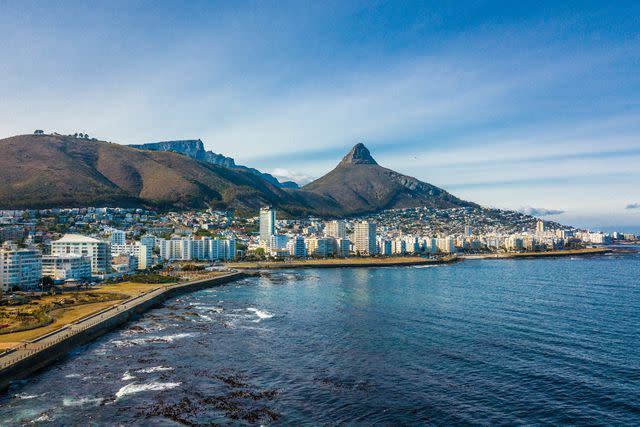
Rodger Shagam/Getty Images
What’s more, it’s a well-known fact that those spending U.S. dollars get amazing value for their money — all in a country where English is spoken and there are flawless beaches, endless savannas, and impressive mountains. Having visited South Africa’s coastline, wine country, Garden Route, and wildlife preserves over the years in January, February, October and December, I have experienced a variety of weather conditions, from extreme wind to fog to baking heat. Oftentimes, it feels like multiple seasons in one day, especially in Cape Town, so I always pack a lot of adaptable layers.
Roar Africa founder and CEO Deborah Calmeyer, a safari expert and part-time Cape Town resident, loves being there most in March, when “there are no crowds and perfect warm weather to enjoy all the beauty of Table Mountain and the emerald Winelands without the December rush of people.”
For her, the reasons to visit South Africa are as numerous as its healthy populations of zebras, lions, rhinos, and elephants: “the level of service; the restaurants, in both the cities and the bush; and the diversity of experience — the cosmopolitan culture of Cape Town, the beauty of the Winelands, the ochre dunes of the Kalahari Desert, and the abundance of pristine bush, teeming with wildlife.”
High Season: December through February
Shoulder Season: September to November; March to May
Low Season: June to August
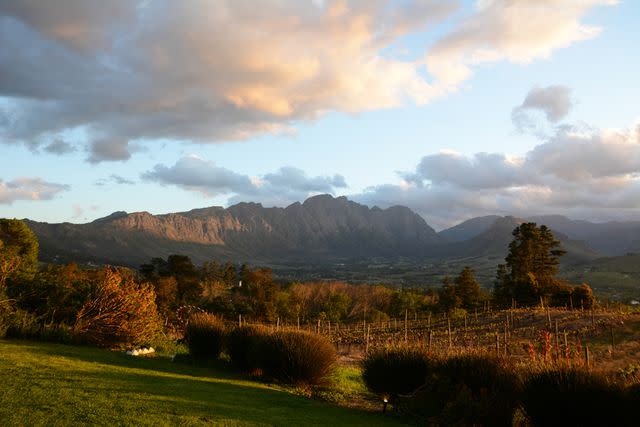
Jess Macdonald/Travel + Leisure
Best Time to Visit for Smaller Crowds
If you don’t like crowds, avoid Cape Town during its busy holiday surge in December and January, says Calmeyer, who adds that the most thronged months for safari tend to be December and June through August. The rest of the year, adventurers are typically blessed with more intimate experiences for viewing wildlife plus fewer vehicles around exciting sightings. “There is so much beauty throughout the other months of the year and, provided you have the right gear, you’ll have a spectacular experience in this country of contrasts,” Calmeyer adds. According to Mandy, the quietest times to travel in South Africa are October, November, April, and May — the country as a whole receives fewer visitors during these months.
Best Time to Visit for Lower Prices
In Cape Town, travelers will typically find May through August “the lightest on the pocket,” says Mandy, adding that the best pricing on a full South Africa itinerary — one that includes a safari — can be found in the shoulder season of April and May, their autumn. September, which tends to be somewhat quiet, can also be more accessible price-wise, according to Calmeyer. Conversely, December is when prices hit their peak, and oftentimes hotels and lodges enforce minimum stay periods.
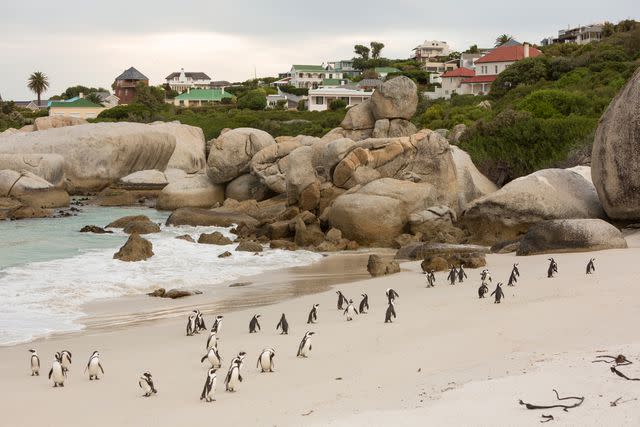
Michele Westmorland/Getty Images
Best Time to Visit for Good Weather
“South Africa has a very pleasant and favorable climate year-round,” says Mandy, who notes that spring and autumn offer the most balanced weather in the majority of the country. Mandy’s personal favorite season is spring, fromSeptember to November. “It offers beautiful displays of blooming gardens and wildflowers on safari,” he says. “The weather is perfect — neither too hot nor too cold.” Between October and May — essentially the shoulder seasons and summertime (a.k.a. high season) — Calmeyer says the weather on the Western Cape is her favorite. The same goes for safari destinations across the country. “The weather is brilliant,” she says. These are also the best months for hiking, in her opinion, as there's little rainfall (contrary to Johannesburg, where most of the rain occurs in their summer). One disclaimer: Because South Africa is so large, with lots of geographical diversity, there are plenty of climate quirks as you traverse different regions.
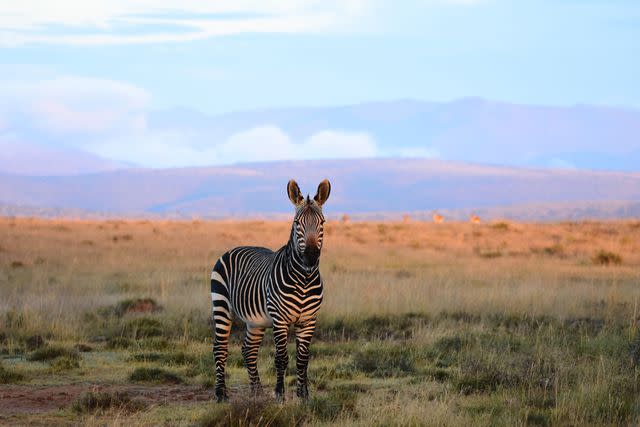
Jess Macdonald/Travel + Leisure
Best Time to Visit for a Wildlife Safari
In Calmeyer’s expert opinion, “anytime” can be the right time to take a wildlife safari — if you use the right local travel advisor with an intimate knowledge of the country’s parks and regions, which range from the Kalahari in the Northern Cape to the most famous Kruger National Park. “There are epic opportunities for wildlife viewing 12 months a year,” she says. Typically, the drier months (June to September) are considered excellent times because “animals gather around water sources in the absence of rain,” says Mandy, meaning they can be easier to spot. The vegetation also typically dies back during these months, making smaller creatures more visible. He adds, “If you’re an avid bird-watcher, the warmer months (November to February) see the arrival of migratory birds and a dramatic increase in volume of the dawn chorus.” That time of year is referred to as green season, when the weather tends to be rainy and warm in wildlife reserves and parks.
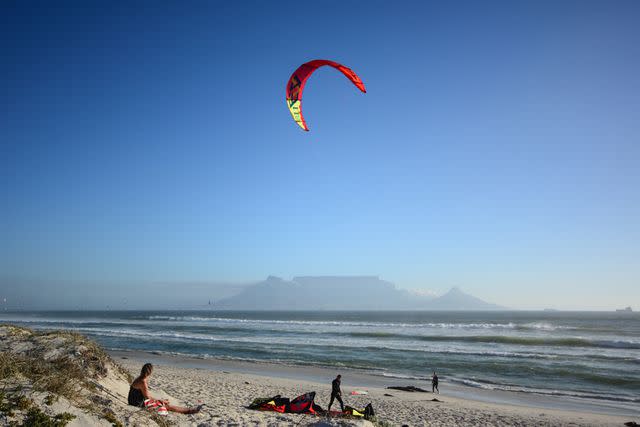
Jess Macdonald/Travel + Leisure
Best Time to Visit for a Beach Holiday
There’s no question that summer in South Africa (December to February) is the best time to sunbathe on one of the many spectacular beaches that wrap its long, 1,770-mile coastline. Still, don’t expect leisurely swims in the sea. “Don’t forget that it is the Atlantic Ocean, so you are unlikely to get in, as it’s cold,” says Calmeyer. “However, for those who enjoy colder water, Cape Town is fabulous in December and January, with white-sand beaches, abundant water activities, and incredible snorkeling and diving opportunities in the Great African Seaforest” — the giant bamboo kelp forest seen in the documentary "My Octopus Teacher." For wetsuit-clad surfers, summer tends to equal smaller waves — plus wind — while the peak surf season is March to September, when the water is at its most frigid (low 70s). Regardless of the season, Mandy adds, “Be warned: The African sun is harsh, so don’t forget your sunscreen.”
Best Time to Visit for Festivals
Between lively farmers markets in Cape Town and concert series in the Cape Winelands, the pervasive energy in South Africa is festive. The Cape Town Art Fair and Cape Town International Jazz Festival, which both occur each February, are great draws. And I can personally attest that the Summer Sunset Concerts that take place from November through April at Kirstenbosch National Botanical Garden are captivating affairs worthy of a bountiful BYO picnic. Mandy adds, “The popular concerts offer live music in a picturesque setting beneath Table Mountain.” Harvest season in the Winelands — Franschhoek, Stellenbosch and Paarl — spans February and March, and is an exciting and beautiful time to visit both storied iconic estates and up-and-coming young winemakers.
Worst Time to Visit South Africa
South Africa is one of those places that holds its appeal all year long. However, Mandy warns that some travelers could find the peak of summer a bit too hot — though it typically stays in the 70s and only rarely reaches the 90s — and winter temps in remote mountainous regions in the Northern Cape too cold.
For more Travel & Leisure news, make sure to sign up for our newsletter!
Read the original article on Travel & Leisure.

